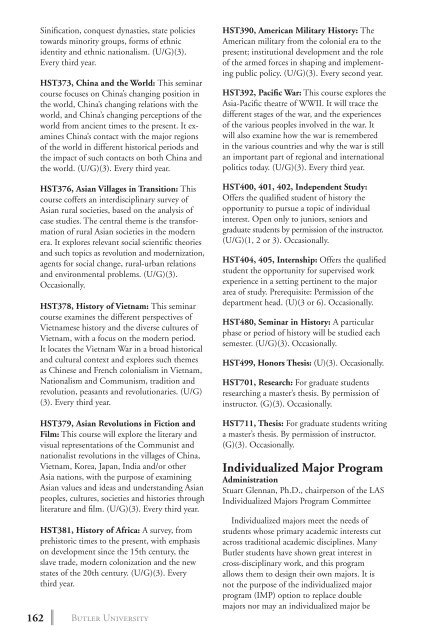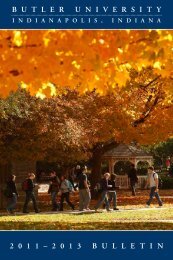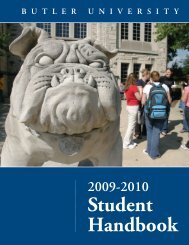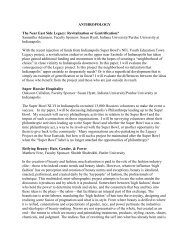The College of Liberal Arts and Sciences - Butler University
The College of Liberal Arts and Sciences - Butler University
The College of Liberal Arts and Sciences - Butler University
You also want an ePaper? Increase the reach of your titles
YUMPU automatically turns print PDFs into web optimized ePapers that Google loves.
162<br />
Sinification, conquest dynasties, state policies<br />
towards minority groups, forms <strong>of</strong> ethnic<br />
identity <strong>and</strong> ethnic nationalism. (U/G)(3).<br />
Every third year.<br />
HST373, China <strong>and</strong> the World: This seminar<br />
course focuses on China’s changing position in<br />
the world, China’s changing relations with the<br />
world, <strong>and</strong> China’s changing perceptions <strong>of</strong> the<br />
world from ancient times to the present. It examines<br />
China’s contact with the major regions<br />
<strong>of</strong> the world in different historical periods <strong>and</strong><br />
the impact <strong>of</strong> such contacts on both China <strong>and</strong><br />
the world. (U/G)(3). Every third year.<br />
HST376, Asian Villages in Transition: This<br />
course c<strong>of</strong>fers an interdisciplinary survey <strong>of</strong><br />
Asian rural societies, based on the analysis <strong>of</strong><br />
case studies. <strong>The</strong> central theme is the transformation<br />
<strong>of</strong> rural Asian societies in the modern<br />
era. It explores relevant social scientific theories<br />
<strong>and</strong> such topics as revolution <strong>and</strong> modernization,<br />
agents for social change, rural-urban relations<br />
<strong>and</strong> environmental problems. (U/G)(3).<br />
Occasionally.<br />
HST378, History <strong>of</strong> Vietnam: This seminar<br />
course examines the different perspectives <strong>of</strong><br />
Vietnamese history <strong>and</strong> the diverse cultures <strong>of</strong><br />
Vietnam, with a focus on the modern period.<br />
It locates the Vietnam War in a broad historical<br />
<strong>and</strong> cultural context <strong>and</strong> explores such themes<br />
as Chinese <strong>and</strong> French colonialism in Vietnam,<br />
Nationalism <strong>and</strong> Communism, tradition <strong>and</strong><br />
revolution, peasants <strong>and</strong> revolutionaries. (U/G)<br />
(3). Every third year.<br />
HST379, Asian Revolutions in Fiction <strong>and</strong><br />
Film: This course will explore the literary <strong>and</strong><br />
visual representations <strong>of</strong> the Communist <strong>and</strong><br />
nationalist revolutions in the villages <strong>of</strong> China,<br />
Vietnam, Korea, Japan, India <strong>and</strong>/or other<br />
Asia nations, with the purpose <strong>of</strong> examining<br />
Asian values <strong>and</strong> ideas <strong>and</strong> underst<strong>and</strong>ing Asian<br />
peoples, cultures, societies <strong>and</strong> histories through<br />
literature <strong>and</strong> film. (U/G)(3). Every third year.<br />
HST381, History <strong>of</strong> Africa: A survey, from<br />
prehistoric times to the present, with emphasis<br />
on development since the 15th century, the<br />
slave trade, modern colonization <strong>and</strong> the new<br />
states <strong>of</strong> the 20th century. (U/G)(3). Every<br />
third year.<br />
<strong>Butler</strong> <strong>University</strong><br />
HST390, American Military History: <strong>The</strong><br />
American military from the colonial era to the<br />
present; institutional development <strong>and</strong> the role<br />
<strong>of</strong> the armed forces in shaping <strong>and</strong> implementing<br />
public policy. (U/G)(3). Every second year.<br />
HST392, Pacific War: This course explores the<br />
Asia-Pacific theatre <strong>of</strong> WWII. It will trace the<br />
different stages <strong>of</strong> the war, <strong>and</strong> the experiences<br />
<strong>of</strong> the various peoples involved in the war. It<br />
will also examine how the war is remembered<br />
in the various countries <strong>and</strong> why the war is still<br />
an important part <strong>of</strong> regional <strong>and</strong> international<br />
politics today. (U/G)(3). Every third year.<br />
HST400, 401, 402, Independent Study:<br />
Offers the qualified student <strong>of</strong> history the<br />
opportunity to pursue a topic <strong>of</strong> individual<br />
interest. Open only to juniors, seniors <strong>and</strong><br />
graduate students by permission <strong>of</strong> the instructor.<br />
(U/G)(1, 2 or 3). Occasionally.<br />
HST404, 405, Internship: Offers the qualified<br />
student the opportunity for supervised work<br />
experience in a setting pertinent to the major<br />
area <strong>of</strong> study. Prerequisite: Permission <strong>of</strong> the<br />
department head. (U)(3 or 6). Occasionally.<br />
HST480, Seminar in History: A particular<br />
phase or period <strong>of</strong> history will be studied each<br />
semester. (U/G)(3). Occasionally.<br />
HST499, Honors <strong>The</strong>sis: (U)(3). Occasionally.<br />
HST701, Research: For graduate students<br />
researching a master’s thesis. By permission <strong>of</strong><br />
instructor. (G)(3). Occasionally.<br />
HST711, <strong>The</strong>sis: For graduate students writing<br />
a master’s thesis. By permission <strong>of</strong> instructor.<br />
(G)(3). Occasionally.<br />
Individualized Major Program<br />
Administration<br />
Stuart Glennan, Ph.D., chairperson <strong>of</strong> the LAS<br />
Individualized Majors Program Committee<br />
Individualized majors meet the needs <strong>of</strong><br />
students whose primary academic interests cut<br />
across traditional academic disciplines. Many<br />
<strong>Butler</strong> students have shown great interest in<br />
cross-disciplinary work, <strong>and</strong> this program<br />
allows them to design their own majors. It is<br />
not the purpose <strong>of</strong> the individualized major<br />
program (IMP) option to replace double<br />
majors nor may an individualized major be
















